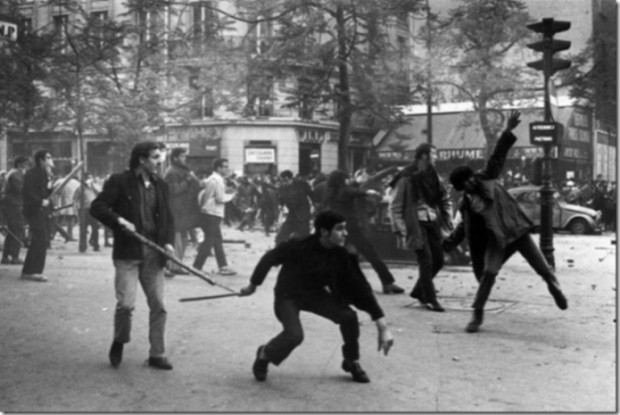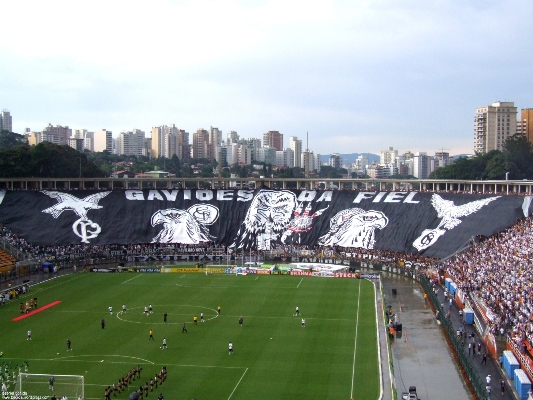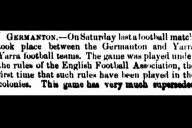It’s not quite May 1968, but an air of protest has swept through the supporter groups belonging to the navy blue three quarters and the red and white quarter of A-League Melbourne this season.
At Victory, a vanguard led by a collective of supporter groups, North Terrace, are protesting over-zealous security measures in their active area. They have sent missives on social media which read like an apprentice Subcommandante Marcos addressing the International Court of Justice and have migrated from their designated section to roost, mainly in silence, in the upper levels of Etihad Stadium.
Meanwhile, over at Heart, it is on-field mediocrity which has awoken the spirit of dissent at the Yarraside. The Heart active supporter group took to Facebook last week to announce:
“Yarraside leadership believe that the club’s on field performance needs to be addressed immediately. We feel that positive change is required for our beloved club to reach its full potential. Therefore, Yarraside will be undertaking a silent sit down protest during the first half (only) of the Adelaide game on Sunday 1 December.”
There is nothing new or novel in all this. The world of modern club football is in a continual state of upheaval.
Active supporters are in a permanent state of alert. On one side they have to look out for opportunistic politicians, misguided administrators and boorish security services trying to make their day out as difficult as possible. On the other side they have to keep avaricious owners, incompetent boards, and dysfunctional football departments on notice as they try to make sure the standard of football on the pitch reflects their passion on the terraces.
The modern opiate of the people
Marxist intellectual Terry Eagleton lamented on the eve of the 2010 World Cup:
“If every rightwing think-tank came up with a scheme to distract the populace from political injustice and compensate them for lives of hard labour, the solution in each case would be the same: football.”
Obviously he was following in the footsteps of uber-intellectual Noam Chomsky, who famously said:
“Take, say, sports – that’s another crucial example of the indoctrination system, in my view. For one thing because it – you know, it offers people something to pay attention to that’s of no importance. That keeps them from worrying about things that matter to their lives that they might have some idea of doing something about.”
In our commodified world, their words can on a superficial level sound convincing.
If only they had the insight of our existential goalkeeper Albert Camus: “I rebel – therefore we exist.”
Sure, taken at face value, rebellion on the A-League football terrace is not rebellion on a much wider political or social scale. All you see is a bunch of pimply wannabe hooligans…right.
But there is a deeper context to what a football terrace represents which should be understood. Throughout the world, the football terrace has been a place where, despite liberties being curtailed elsewhere, people could express themselves freely – unshackled from political and cultural edicts.
Football rebellion spills into real life
This was very much the case in Egypt where the football terrace became the place where young men gathered to face down Mubarak’s hated security apparatus.
Football writer James Montague on how Egypt’s football fans became the fist of the revolution that toppled Mubarak:
“In 2010 banners start to appear with the acronym ACAB – ‘All Cops Are Bastards’. Members of the Ahlawy start to be arbitrarily beaten and arrested. Fans are harassed and strip-searched at every game. Ahly’s matches become a microcosm of the heavy-handedness that the rest of the country feels on a daily basis.
“When the revolution started on 25 January 2011, followed by the ‘Day of Rage’ three days later, it was the Ultras who stood on the front line, prepared to do whatever was necessary. The men draped in red had become the voice and the fist of the revolution.”
Here’s our existential goalkeeper again: “In order to exist, man must rebel, but rebellion must respect the limits it discovers in itself.”
“In order to exist, man must rebel, but rebellion must respect the limits it discovers in itself.”
Australia, thankfully, is not Egypt. The A-League football terrace is more concerned about affirming the rights of the active fan’s team rather than overthrowing a dictator.
It is also not Italy, where mediocrity on the pitch provokes a much more serious response than Yarraside’s 45 minute silent treatment. As Carlo Ancelotti put it:
“There, you can find 1,000 unhappy people outside the training ground. It’s difficult to fight with 1,000 people. With one, we can manage. If it’s only one, there’s no problem.”
And it is certainly not Brazil, where after an inept performance in the derby against Santos in 1997, Corinthians supporter group Hawks of the Faithful (Gaviões da Fiel) stopped the team bus on a mountain pass, smashed the bodywork in a hail of objects and scared the bejesus out of the players and officials inside by rocking the bus to and fro.
There are over 50,000 paid up members of the Hawks. They were founded in the late ‘60s as opposition to the elite who ran the club. In a climate of political repression, the terrace became a place where people with few rights could at least defend their rights as fans.
For people who have little, the club can almost mean too much. With support like this from the Hawks on the terrace…
…it is all but impossible for the players not to respond.
But there’s a darker side to this fanatical support: 100% effort off the pitch has to be matched with 100% on it. Club and player performance is so heavily scrutinized that it is not the club’s owners and administrators the players are answerable to, but the fans who operate with the efficiency of the Stasi as they monitor the late night activities of the bodyguarded players who wear their colours.
From the terrace to the pitch
I will let our goalkeeping friend make one final appearance before the final whistle blows on this piece.
“Moderation is not the opposite of rebellion. Rebellion is in itself moderation, and it demands, defends, and re-creates it throughout history and its eternal disturbances.”
The big match is over. The home team has lost, but the fans don’t leave. They don’t protest. They know the team has given its all. They were not disgraced. The team plays for the Kop. The Kop believes in them and has their back. It all coalesces into a moment of football transcendence.
Maybe, one day the Melbourne Heart will also give their fans something really to believe in? And Victory fans might even have won the support and co-operation of their club’s administration?
The sprouts of rebellion seen among A-League fans may just indicate the beginnings of an organic fan culture for the competition, providing supporters with the type of passion and transcendence Camus so eloquently talks about.
For more on Brazil’s football obsession, check out Futebol: The Brazilian Way of Life.

















